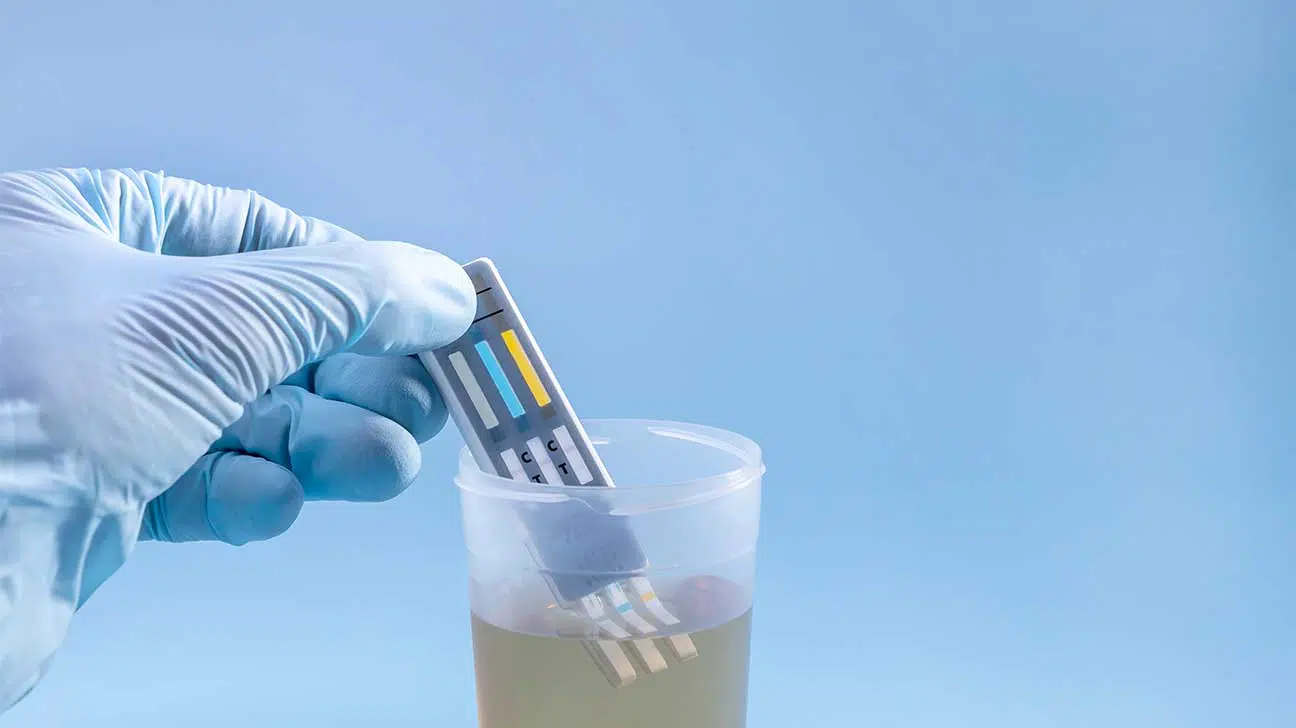How Long Can Alcohol Be Detected In Urine?
How long alcohol stays in urine can vary depending on many factors, but it can typically be detected between 24 and 72 hours. Testing in this manner is very accurate, fast, and easily accessible through lab testing and at-home kits.

Alcohol can be detected in urine for about 24 hours after your last drink. For greater quantities of alcohol, it can be detected for 72 hours or longer.
Like a breath test (breathalyzer test), this process is quite common and detects your blood alcohol concentration (BAC). Other alcohol drug tests are used over different time frames.
Read on to learn more about the average drug test detection times for alcohol and how urine tests detect the presence of alcohol in your system.
About Urine Ethyl Glucuronide (EtG) Testing
Ethyl glucuronide (EtG) is a biomarker made by the body by combining ethanol in alcoholic beverages with glucuronide, a common biologic compound made in the liver.
Because alcohol is a toxin, your body wants to excrete it as soon as possible. Binding it together to form a byproduct like EtG allows it to do so quickly, bypassing it through the urine.
Ethyl sulfate (EsT) is another biomarker (also known as an alcohol metabolite) that can be used for similar testing.
Even after drinking a small amount of alcohol, there is enough EtG or EtS to be detected in a urine sample. A positive result occurs if it is above a certain cut-off point.
Drug screening with an EsT or EtG test can be done with laboratory testing, or with a kit on-site or at home. Test results can take a few days to be processed by a lab.
What Factors Affect How Long Alcohol Stays In Urine?
There are a wide variety of factors that can change how long the alcohol content in your system is detectable. Some of these factors can be controlled, and some cannot.
A few of of these factors include:
- age
- gender
- weight and percentage of body fat
- physical health and exercise habits
- history of past alcohol use
- the number of alcoholic drinks consumed
- fluid intake
- liver and kidney function
- metabolism
- if the alcohol was consumed on an empty stomach
Why Would I Need A Urine Test For Alcohol?
There are many reasons this type of test might be utilized. It is very common to have an alcohol urine test for work, for example.
This test is also popular for ensuring alcohol abstinence during a stay at a rehab clinic or during an outpatient treatment program.
Other reasons you or a loved one may be required to submit a urine test could include court cases, traffic accidents where there is suspicion of impairment due to alcohol use, and more.
How Accurate Is A Urine Test For Alcohol?
Urine tests for alcohol are considered very accurate for alcohol screening.
They are one of the most common testing methods for alcohol and are more likely to be used than a hair test for alcohol abuse or a blood test for drinking.
False Positives For Urine Tests
As a disclaimer, false positives can happen on rare occasions with this test.
This is because EtG and EtS can be created from exposure to other sources of alcohol products, such as cough medicine, hand sanitizer sprays, and mouthwash, among other common items.
This form of drug testing can also be tampered with, as clinicians are not usually able to directly observe the collection process.
Start Your Recovery From An Alcohol Addiction
If you or a loved one is experiencing heavy drinking, substance abuse, or any other issues with mental health, you are not alone.
The treatment programs at Spring Hill Recovery Center can help you get the care you need. Our healthcare professionals are waiting for your call, so reach out today to get started.
- Medical University of South Carolina — About Urine Ethylglucuronide (EtG) Testing https://medicine.musc.edu/departments/psychiatry/divisions-and-programs/programs/cnl/heavy-alcohol-testing/etg
- Medical University of South Carolina — CNL Alcohol Biomarker Tests https://medicine.musc.edu/departments/psychiatry/divisions-and-programs/programs/cnl/heavy-alcohol-testing/biomarker
- National Institute of Health | National Center for Biotechnology Information — Urinary ethyl glucuronide and ethyl sulfate testing for recent drinking in alcohol-dependent outpatients treated with acamprosate or placebo https://pubmed.ncbi.nlm.nih.gov/21616946/


